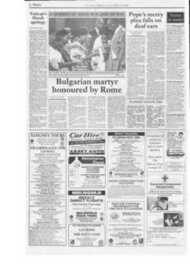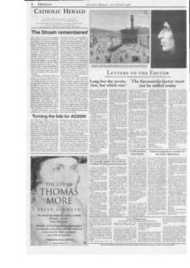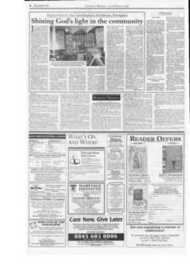Page 10, 20th March 1998
Page 10

Report an error
Noticed an error on this page?If you've noticed an error in this article please click here to report it.
Tags
Share
Related articles
Chaplai N Back From France
Conversion To I
Feminine Forumlothwi I
Nun Aims To Make Church Visible
Liz Hurley Pro-life Heroine
Where poor are rich
young men and women were, he said, wasting their time. What were we doing with people like him?
HE H F AI) E1:1' like
this for three days.
Then one of the
young girls was dressing him. She was particularly good looking, he told us. Suddenly he knew that if a beautiful girl like her was prepared to waste her time with an ugly old man like him, there had to be a God. He had been going to die angry, but now he was full of joy. He had been afraid, but now his heart was filled with hope. I saw him in hospital in Middlesbrough before he died, and I know he died a happy man.
Listening to this old man was a powerful experience,
but for me the most powerful experience in Lourdes is the sense of forgiveness that comes from opening your heart to God. Often I have sat, quietly, with a priest near the Grotto and told him all. The sacrament of reconciliation at Lourdes seems to have been particularly graced.
Fr Martin Haigh, who at that time was director of the Arnpleforth Pilgrimage, used to tell how he was trying to describe Lourdes to a group of people who had not been there before. He could not make himself clear. Fortunately, Judge Arthur was with him. "You know what it is like at Christmas," he said, "when you forget whom you've quarrelled with and people forgive each other, and you can hug people you don't normally hug and kiss people you don't normally kiss? Well in Lourdes, every day is Christmas."
In Lourdes, as a guide with a group of pilgrims, I miss these experiences but there are other joys. I love to take a group of pilgrims who are new to Lourdes to see the Boly Mill, where Saint Bernadette was born, and the Cachot, the disused prison cell in which her family were living in 1858. It had been condemned
as unfit for human habitation 30 years before, but it was the only place her family, who were absolutely destitute, had been able to take refuge.
The hotels we now use stand by the River Gave in the place where Bernadette and other poor children would have collected wood. We have every comfort, and three meals a day, Bernadette and her family would have been living in a hovel smaller than some hotel bedrooms, and certainly less comfortable.
They were on the verge of starvation. Bernadette's
younger brother had been found eating candle grease in the parish church. The children had been sent to collect more firewood because they had sold the last of their stock to buy bread.
I have often taken pilgrims to Lourdes who have collected firewood themselves as children. They identify strongly with Bernadette, especially those who come from developing countries.
Only poor children collect firewood. The rich do not have to, they go to school instead. When a priest member of the Commission of Enquiry asked Bernadette why she thought Our Lady had chosen her she replied: "if she could have found some one poorer and more ignorant, then she would have chosen them instead."
In his controversial book, Mary and Human Liberation, the Sri Lanken theologian Fr Tissa Ballasuriya asks why Our Lady had nothing to say to victims of the industrial revolution_ Yet Bernadette herself was a victim of the industrial revolution.
It used too be said that her father had lost the little Holy Mill from incompetence. Bernadette and her family had
lived there happily for 10 years before he was evicted, unable to pay the bills. We now know that huge industrial steam mills forced little mills like the Boly out of business.
Nowhere is this clearer than in Bartres. As a baby, Bernadette was sent to a wetnurse, Marie Lagues (nee Aravant), because after an accident her mother was unable to feed her. Her parents were well off enough to pay her five francs a month. Bernadette returned home, aged 13, as maid of all work and shepherdess, because they were destitute. She was one less mouth to feed. Her father hired out his tabour for one franc 20 centimes a day, if he could get work.
The Church in Bartres is dedicated to John the Baptist. Bernadette would have known it, and worshipped there herself. The nave has now been rebuilt, but the chancel is medieval. She would have recognised the gilt oak statues of Our Lady and St Joseph which remain, and the three panels behind the altar illustrating scenes from the life of St John: the Visitation, the Baptism of Jesus, and his head on a platter.
The parallels between Bernadette and St John the Baptist are striking. John preaches repentance, the first message of Our Lady to Bernadette is "penitence, penitence, penitence". John points to Jesus, Bernadette to his mother. John says "he must increase, I must decrease," Bernadette goes to N'evers to hide. "What do you do with a broom when you have finished using it? You put it in the cupboard," she says. But there is a deeper and more important comparison.
John preaches a gospel of justice, of real conversion. Bernadette warns of the danger of becoming rich. She emphasises the importance of caring for the sick. By the standards of the world, what is important is a fast car, nice house, a good-looking spouse, a good job, a luxury holiday and plenty of money. But in Lourdes it is the poor and the sick who are important.
By the standards of the world they are on the edge, ignored, but at Lourdes they take priority. Young people, and the not so young, come from all over Europe, from all over the world, to care for them in hospitals which are newly rebuilt and in the Cite St Pierre, the City of the Poor.
They give up their holidays and come at their own expense. This is not just a week of doing good, but a fundamental statement of what life is about.
blog comments powered by Disqus











